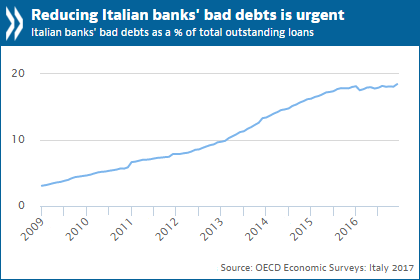Sustained reforms are essential to reinforcing inclusive growth in Italy
Italy is slowly emerging from a deep and lengthy recession, helped by a range of structural reforms – such as the Jobs Act – and accommodative monetary and fiscal policies, according to a new OECD report.

The Economic Survey of Italy says that to boost inclusive growth, Italy needs to maintain a people-centred focus on enhancing well-being, reducing labour market duality and the mismatch of skills with jobs, while improving access to employment opportunities and vocational education for disadvantaged groups.
The report also highlights that vital reforms to create a more effective public administration and improve the business environment must continue. A rapid and effective boost to infrastructure spending will be essential to raise investment while ensuring the continuation of prudent fiscal policies.
The Jobs Act and temporary cuts in social security contributions for new permanent contracts have contributed to rising employment and higher consumer spending. But the recovery remains weak because of low investment and a challenging international environment, says the report.
Productivity growth is low and the benefits are not shared sufficiently across the country. Inefficiencies in the public administration and judicial system, as well as weak competition in some sectors, still hamper business dynamism. The rejection of constitutional reform in the December 2016 referendum also risks slowing down reforms.
Speaking in Rome to launch the report alongside Italian Finance Minister Pier Carlo Padoan, OECD Secretary-General Angel Gurría said, “The significant reforms of recent years are beginning to pay off. Growth is recovering slowly, but complex challenges still remain. For the well-being of all Italians, it is imperative that the reform process continues and that the new measures are implemented fully and effectively.”
Mr Gurría said the four main challenges are to increase productivity and investment; return the banking system to health; boost jobs and skills; and reduce poverty, particularly among the young who have suffered the sharpest falls in income since the crisis.
“By tackling labour market duality, which protects insiders with secure jobs but excludes outsiders such as the young and those with lower skills, and by introducing a modern unemployment insurance system, the Jobs Act is an important economic and social reform”, Mr Gurría said. “Full implementation of the new job search and training policies together with the Buona Scuola education reform will help improve the skills and talents of workers and students”, he added. (read the full speech)
Other OECD’s recommendations include:
● Enhancing tax compliance through greater investment in information technology and staff resources; lowering the cash payment threshold; introducing property taxes based on updated cadastral values,
● Approving and implementing the planned anti-poverty programme, targeted towards the young and children,
● Fostering the development of a venture capital industry by raising private funds and expertise,
● Stepping up vocational education and training through strong involvement with the business sector.
Source: Organization for Economic Co-operation and Development
- 266 reads
Human Rights
Ringing FOWPAL’s Peace Bell for the World:Nobel Peace Prize Laureates’ Visions and Actions

Protecting the World’s Cultural Diversity for a Sustainable Future

The Peace Bell Resonates at the 27th Eurasian Economic Summit

Declaration of World Day of the Power of Hope Endorsed by People in 158 Nations

Puppet Show I International Friendship Day 2020

